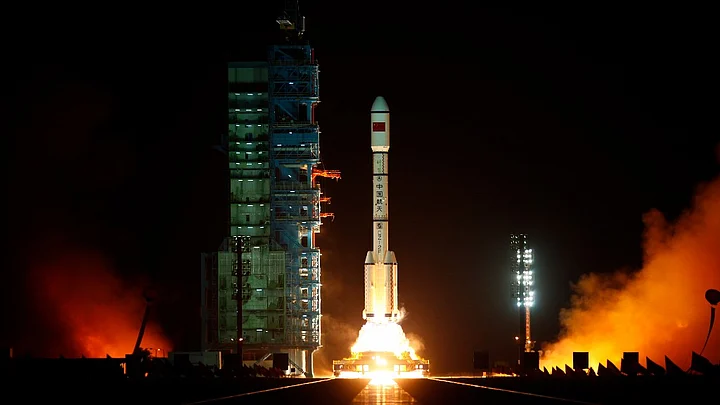Too caught up to read? Listen to the story instead:
The spiraling out-of-control of China’s first prototype space station, Tiangong-1, with which the Chinese space agency has lost all contact, and its impending re-entry into the Earth’s surface, has provoked much conjecture about where the space debris will fall and how much damage it is going to cause.
Experts suggest that space debris from Tiangong-1, surviving the re-entry to Earth, is expected to cause insignificant damage, however, The Guardian reported that the Aerospace Corporation “warned that the space station might be carrying a highly toxic and corrosive fuel called hydrazine on board”.
Liability for Damage Caused on Earth
Amidst all this buzz around Tiangong-1, it is necessary to assess whether space laws ratified by the countries are adequate to cover liabilities arising out of damage caused by the falling space debris in outer space or on the surface of the Earth.
Could China be held accountable in the event some damage is caused to any person, property or to the outer space environment?
The Outer Space Treaty, which came into effect in 1967, provides for international liability of a state party to the treaty under Article VII, “for damage to another State Party to the Treaty or to its natural or juridical persons by such object or its component parts on the Earth, in air or in outer space, including the moon and other celestial bodies.”
The Liability Convention was then adopted in 1972 as an elaboration upon the liability principle laid down in Article VII of the Outer Space Treaty.
China, being a party to both conventions, could be liable for damage, if any, caused by the space debris from Tiangong-1.
The Liability Convention defines “damage” to mean “loss of life, personal injury or other impairment of health; or loss of or damage to property of States or of persons, natural or juridical, or property of international intergovernmental organisations.”
The definition of “damage” is wide enough to include any damage to persons or property due to the falling space debris from Tiangong-1.
Additionally, the liability regime set out under the Liability Convention for damage caused by a state’s space object, on the surface of the Earth or to an aircraft in flight, is absolute, that is, there would be no requirement to prove the fault on China’s while claiming compensation for the damage caused.
A notable instance of the application of the Liability Convention was in 1978, when Cosmos 954, Russia’s nuclear-powered-satellite, crashed in Canada, spreading radioactive debris. Canada invoked the Liability Convention and responsibility under the customary principles of international law to claim CA $6 million from Russia, mainly as clean-up costs. However, the matter was settled through diplomatic channels and Russia finally agreed to pay CA $3 million.
This is the only instance in which the Liability Convention has been successfully invoked.
The only other instance of such a nature was the crash of the US Skylab space station in the Australian desert which did not result in any actionable claims under the Liability Convention.
While the Liability Convention, strictly speaking, covers damage caused to person or property by the falling space debris from Tiangong-1, it does not cover any liability for harmful contamination of the outer space environment.
Liability for Damage to Outer Space Environment
In case of Tiangong-1, the possibilities that there will be harmful space debris left behind in outer space or the “toxic and corrosive fuel” on board will cause damage to the outer space environment and Earth’s atmosphere have not been ruled out.
The existing space laws, however, do not provide any liability for damage caused to the extra-terrestrial or terrestrial environment.
While there are Space Debris Mitigation Guidelines in place, these do not create any binding obligations on countries to not contaminate the outer space environment or to mandatorily remove the space debris. The guidelines only provide a mechanism to mitigate space debris. Additionally, there are no liabilities in place for any harmful contamination caused to the outer space environment.
Even the Rescue Agreement, in part, only relates to the return of space debris discovered by a contracting state or intimation regarding the space debris discovered, to the launching authority.
Contamination of the environment due to space debris is a growing concern. According to the United Nations Office for Outer Space Affairs, only “1,400 of the 19,000 artificial objects presently being tracked in Earth orbit are functional satellites” and the rest constitute space debris.
Considering that countries are increasingly participating in outer space activities, the existence of space debris not only pollutes the outer space environment but also poses a significant danger to the exploration activities of other countries.
According to the Aerospace Corporation, space debris “can have effects ranging from negligible and undetectable to catastrophic and mission-ending.”
Leaving aside a general need to have more robust space laws, China’s Tiangong-1 and similar situations, should serve as a reminder to countries to take a re-look at the existing space laws and, in particular, the issues relating to space debris in the outer space environment.
(Kruti Venkatesh is a lawyer practising in Mumbai. She can be reached at @kruti07. This is an opinion piece and the views expressed above are the author’s own. The Quint neither endorses nor is responsible for them.)
